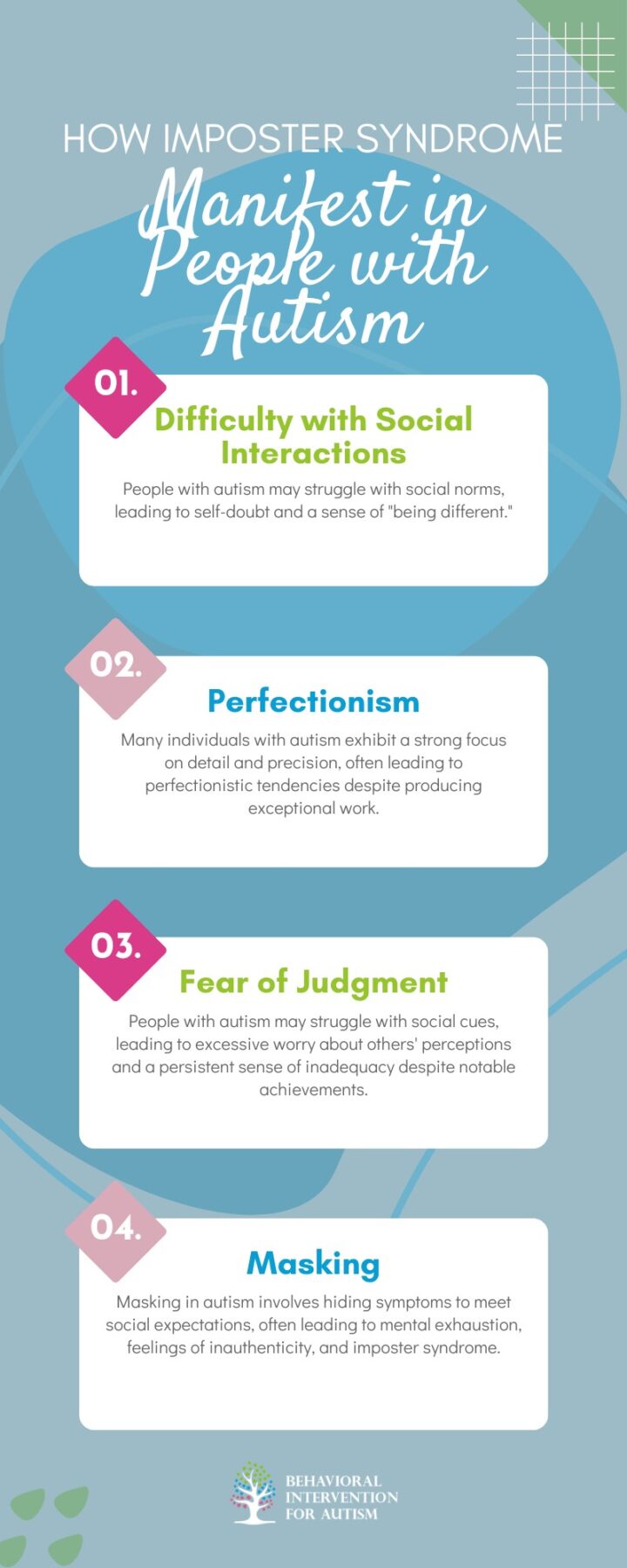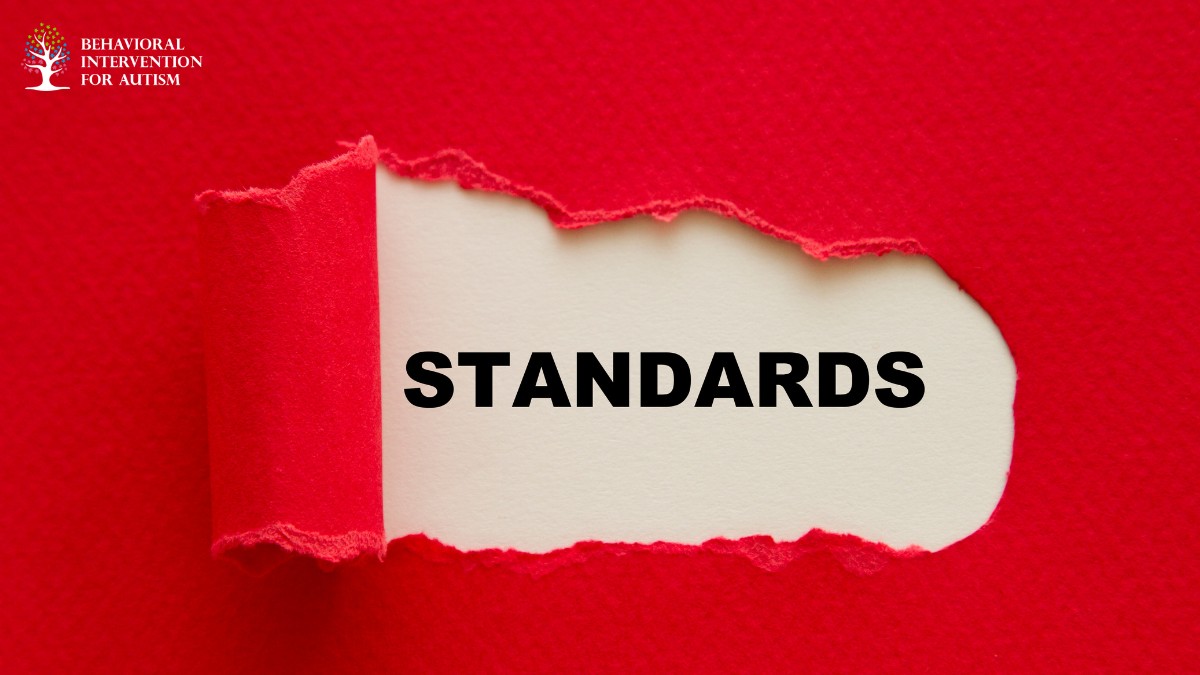
Table of Contents
Imposter syndrome is characterized by self-doubt and a fear of being exposed as a phony, despite clear evidence of one’s success. While this phenomenon can affect anyone, it is particularly common among individuals with autism spectrum disorder (ASD) and can significantly impact their mental health. For those on the autism spectrum, the challenges of managing social interactions, understanding non-verbal cues, and navigating societal expectations can compound feelings of inadequacy. In this article, we will explore the intersection of imposter syndrome and autism, how it manifests, and the steps individuals with autism can take to cope with and overcome these feelings.
What is Imposter Syndrome?
Imposter syndrome was first identified in the 1970s by psychologists Suzanne Imes and Pauline Clance. It refers to the tendency of individuals to feel like they are undeserving of their achievements and that their success is due to luck or external factors rather than their own abilities. These individuals often fear being “found out” and may experience high levels of anxiety and stress.
While imposter syndrome can affect anyone—regardless of age, gender, or background—individuals with autism may be particularly vulnerable due to the unique challenges they face in social, academic, and professional settings. This heightened vulnerability can make managing imposter syndrome even more difficult, especially when societal expectations often misinterpret or overlook their strengths and struggles.
Impacts of Imposter Syndrome on Mental Health
For individuals with autism, imposter syndrome can significantly affect mental well-being. The constant fear of being exposed as a fraud can lead to feelings of inadequacy, self-doubt, and anxiety. These feelings may prevent them from fully engaging in social or professional activities, potentially causing them to withdraw from opportunities or even avoid challenges altogether. In severe cases, these feelings of impostorism can lead to depression or other mental health disorders.
Understanding these impacts is critical to providing support for those affected. By acknowledging the emotional weight of imposter syndrome, individuals with autism and their support networks can better address the underlying issues and work toward healthier coping strategies.
How Imposter Syndrome Manifest in People with Autism
People with autism often face unique struggles that make them more susceptible to experiencing imposter syndrome. These struggles may stem from social difficulties, communication challenges, or misunderstandings about their capabilities and intentions. Here are some ways imposter syndrome manifests in individuals on the autism spectrum:

Real-Life Examples of Imposter Syndrome in Autism
Consider an individual on the autism spectrum who has succeeded academically, earning high grades in school. Despite their success, they may feel like an outsider in their social circles, struggling to relate to their peers. As a result, they might attribute their achievements to luck or external factors rather than their own hard work and intelligence. This disconnect between their internal experience and external success creates a perfect breeding ground for imposter syndrome.
Similarly, an adult on the autism spectrum who has achieved professional success might fear that colleagues or supervisors will discover their “true” capabilities and “expose” them as a fraud. This fear of exposure can prevent them from pursuing further opportunities or advancing in their careers.
Contributing Factors to Imposter Syndrome in Autism
Several factors contribute to the development of imposter syndrome in individuals with autism. These factors often stem from the interplay between neurological differences, societal expectations, and personal experiences. Understanding these contributing factors is essential in addressing imposter syndrome effectively.
Neurological Differences
Autism spectrum disorder is characterized by differences in social communication and behavior, including difficulty in processing social information and navigating complex social dynamics. These differences can make it challenging for individuals with autism to understand their place in social contexts and perceive their accomplishments as valid.
The internalization of these differences can lead to self-doubt and insecurity, particularly when individuals feel they are not meeting societal expectations. Additionally, the sensory sensitivities and heightened emotional responses that often accompany autism can amplify the stress associated with imposter syndrome.
Societal Expectations and Stereotypes
Society often places high expectations on individuals to conform to certain social norms, and this can be especially challenging for individuals with autism. Social conventions, communication styles, and professional expectations may be difficult to interpret and navigate, leading individuals with autism to question whether they belong or deserve success in these contexts.
Societal stereotypes about autism also play a role in fostering imposter syndrome. Individuals on the spectrum may feel they must “prove” their capabilities or meet others’ standards in order to be accepted or valued. This pressure can increase feelings of inadequacy and perpetuate the cycle of imposter syndrome.
Personal Experiences of Rejection and Failure
Past experiences of rejection, failure, or misinterpretation can exacerbate feelings of imposter syndrome in individuals with autism. Negative feedback or experiences of bullying or exclusion can contribute to a fragile sense of self-worth. Over time, these experiences can create an internal narrative of self-doubt, which reinforces the belief that their success is undeserved or temporary.
Lack of Self-Advocacy
Many individuals with autism struggle to self-advocate or assert their needs effectively, particularly in social or professional settings. The inability to communicate their struggles or ask for help can lead to frustration and isolation. In some cases, this inability to advocate for themselves may fuel the belief that they are not capable or deserving of success, contributing to feelings of imposter syndrome.
Coping Strategies for Overcoming Imposter Syndrome in Autism
Although imposter syndrome can be a challenging experience, there are several strategies that individuals with autism can use to manage and overcome these feelings. These strategies focus on building self-awareness, reframing negative thoughts, and seeking support when necessary.
1. Recognize and Reframe Negative Thoughts
The first step in overcoming imposter syndrome is to recognize and challenge negative self-talk. Individuals with autism can benefit from learning to identify distorted thoughts, such as “I’m not good enough” or “I don’t deserve this success,” and replacing them with more balanced and realistic thoughts.
One useful technique is cognitive-behavioral therapy (CBT), which can help individuals restructure their thinking patterns and develop healthier cognitive habits. By learning to reframe negative thoughts, individuals with autism can reduce feelings of imposter syndrome and build greater confidence in their abilities.
2. Focus on Strengths
Another important strategy is to focus on personal strengths and achievements. Individuals with autism often have unique abilities and talents that can be leveraged for success. Encouraging self-reflection on these strengths can help combat the feelings of inadequacy that come with imposter syndrome.
Creating a list of past successes, no matter how small, can serve as a reminder that they have accomplished meaningful goals. By recognizing their strengths and celebrating their achievements, individuals with autism can develop a greater sense of self-worth and begin to see their success as earned rather than accidental.
3. Seek Support and Mentorship
Seeking support from trusted friends, family members, or mentors can be invaluable for individuals struggling with imposter syndrome. Having someone who understands the unique challenges of autism can provide perspective, validation, and reassurance.
Mentorship is particularly effective in helping individuals with autism navigate professional or academic environments. A mentor can offer guidance, share their own experiences with imposter syndrome, and help individuals build confidence in their abilities.
4. Practice Self-Compassion
Self-compassion is the practice of treating oneself with kindness and understanding, especially during difficult times. Individuals with autism can benefit from learning to be gentle with themselves when they experience feelings of imposter syndrome.
Instead of harshly criticizing themselves for perceived shortcomings, individuals with autism can practice self-compassion by recognizing that everyone makes mistakes and that success is a journey, not a destination. By embracing self-compassion, individuals with autism can cultivate a healthier relationship with themselves and reduce the emotional toll of imposter syndrome.
Imposter syndrome is a challenging experience for many individuals, but for those with autism, it can be particularly pervasive due to the unique difficulties they face in social, academic, and professional contexts. By understanding the link between imposter syndrome and autism, recognizing the contributing factors, and implementing effective coping strategies, individuals with autism can begin to overcome these feelings and develop a healthier sense of self-worth.
By building self-awareness, focusing on strengths, seeking support, and practicing self-compassion, individuals with autism can reduce the impact of imposter syndrome and thrive in both personal and professional aspects of their lives.
Reach Out to Us for Support
Imposter syndrome can be especially challenging for individuals with autism, as it often stems from feelings of inadequacy or being misunderstood. These emotions may hinder personal growth and cause unnecessary stress. Recognizing these feelings and addressing them with the right support is crucial. Behavioral Intervention For Autism offers ABA programs in Florida that are tailored to help individuals develop the skills and confidence needed to overcome such challenges. Our team is committed to providing personalized therapy that fosters growth and empowerment. If you or your loved one is struggling with imposter syndrome, connect with us to learn how we can help.
Sources:
https://embrace-autism.com/introducing-autistic-impostor-syndrome/
https://reframingautism.org.au/how-to-navigate-being-newly-diagnosed-as-autistic-as-an-adult/
- 9 Common Obsessions of Children With Autism You Should Know - February 25, 2025
- What is Neurodiversity? A Guide to Embracing Differences - February 25, 2025
- Understanding Hyperfocus in Autism: What It Means and Why It Happens - February 25, 2025


